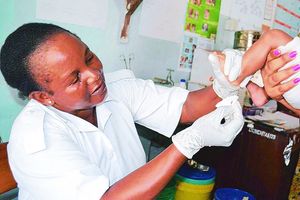Innovation to tackle water and sanitation crisis in refugee settlement

Officials from GIZ and Turkana county government assess a section of fthe irst-ever Decentralised Treatment Facility in the county at Kalobeyei Integrated Settlement .
What you need to know:
- The construction of the facility was necessitated by the water and sanitation challenges arising from the increasing population of refugees and the local population.
- Representatitves from the county government have been equipped with relevant skills to ensure that the facility is properly handled when employing both mechanical and biological processes to produce two valuable products: safe water that can be reused for farming and sludge that can be transformed into soil fertiliser.
A first-ever Decentralised Treatment Facility (DTF) in Turkana County has been installed at Kalobeyei Integrated Settlement as part of sustainable solutions to water scarcity and a biting sanitation crisis resulting from the influx of refugees.
The innovation that was implemented by GIZ through funding from the German Federal Ministry of Economic Cooperation and Development showcases a five-step filtration system that effectively treats faecal waste from toilets.
“The construction of the facility was necessitated by the water and sanitation challenges arising from the increasing population of refugees and the local population. This is besides the fact that we had previously constructed 200 toilets and 10 water kiosks,” GIZ official Agnieszka Samolej explained.
Ms Samolej said the organisation has equipped representatives from the county government with relevant skills to ensure that the facility is properly handled when employing both mechanical and biological processes to produce two valuable products: safe water that can be reused for farming and sludge that can be transformed into soil fertiliser.
Christian Friedemann from the Embassy of Germany in Kenya emphasised on Germany’s commitment to promoting sustainable development, noting that the DTF was a testament towards improving sanitation and hygiene conditions.
Ms Magaret Muta, a South Sudanese refugee, said due to the rising population at the settlement, water access has been a challenge to many; resulting in poor sanitation.
“There is always no escape from water pollution. When it rains, roads and seasonal rivers are choked with sewage. At our capacity, we could not afford the complex sanitation systems needed to make dirty water clean. The DTF is a blessing to us,” Ms Muta said.
“They give people access to basic sanitation, reduce environmental contamination, and turn wastewater into reusable by-products for agriculture and energy.”
Turkana Deputy Governor John Erus said innovative decentralised systems are being planned and implemented for new and future urban development; with Kakuma/Kalobeyei already classified as a special refugee municipality that will benefit from an inclusion plan that will see transitioning of refugee camps in the country into integrated settlements under the multi-year Shirika Plan.
Dr Erus emphasised that the opening of the DTF marks a significant milestone in the transformation of Kakuma and it highlights the importance of preserving natural resources and embracing sustainable solutions to hygiene and sanitation.
Kakuma Camp was established in 1992 following the arrival of the “Lost Boys of Sudan”, and it sits on a 17-square kilometers of land. It is divided into four sections.
When its population hit 188,000 people from 15 nationalities, congestion that led to rise in insecurity and deplorable living conditions like poor sanitation and hygiene informed a decision for establishment of Kalobeyei Integrated Settlement located 20 kilometers away.
The settlement was established through a Kalobeyei Integrated Socio-Economic Development Program (KISEDP), a Turkana-based initiative that sought to facilitate collaboration and coordination between the Kenyan government, UN agencies, development partners, NGOs, private Sector and civil society to build sustainable services and economic activities at the new settlement.
Turkana Governor Jeremiah Lomorukai said that his administration was committed to support refugees and was willing to allocate more land for expansion of the currently congested settlements so long as the due process of land acquisition was followed.
The settlement was established through a Kalobeyei Integrated Socio-Economic Development Program (KISEDP), a Turkana-based initiative that sought to facilitate collaboration and coordination between the Kenyan government, UN agencies, development partners, NGOs, private Sector and civil society to build sustainable services and economic activities at the new settlement.
Turkana Governor Jeremiah Lomorukai said his administration was committed to support refugees and is willing to allocate more land for expansion of the currently congested settlements so long as the due process of land acquisition was followed.





